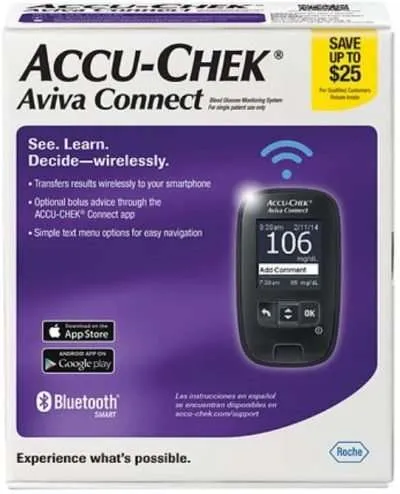Accu-Chek Aviva Connect Meter
$41.49 – $117.99
Accu-Chek Aviva Connect Meter
Reasons to buy

Accu-Chek Aviva Connect Meter
Effective monitoring of your blood sugar levels shouldn’t be complicated and end up consuming precious moments of your day. Now, with the Accu-Chek Aviva Connect Meter, you can allow the device to do the job for you. The meter uses a Bluetooth technology to send results directly to your smartphone via a free app. In coordination with an app or online, the meter reads glucose levels, logs, and records the data, while sharing your levels to any caregiver or doctor you choose. No longer do you have to remember to write your levels down, the device stores them.
Easy-to-fill test strips make sampling quicker than other meters. Only a tiny drop of blood anywhere along the tip is required for a reading to occur in less than 5 seconds. The device is housed in a simple carrying case that is convenient and neatly stored, making your blood sugar check as discreet as you need it to be.
Features:
- Uses ACCU-CHEK Aviva Plus test strips
- Accu-Chek meter transmits blood sugar results to the free Accu-Chek Connect app on your smartphone using Bluetooth® technology – automatically track results without having to log results manually.
- The meter allows results to be forwarded to caregivers
- Manufactured by Roche, largest manufacturer of diabetic supplies in the U.S.A.
- Quick, 5-second results
- Small 0.6 microliter sample size
- Simple designed carrying case
- Rated #1 vs other competing meters
FAQ Regarding Glucose and Testing
What is Glucose?
Glucose is the amount of sugar in the bloodstream. The human body creates insulin (a hormone from the pancreas) which allows sugars to be converted from food so that they can be consumed by the body. These sugars are stored, providing energy for the body to be use as the demands of the body require it.
Why is Glucose Monitoring Important?
Monitoring blood sugar levels is one of the most important things a person with diabetes can do to help prolong their life. Knowing what activities influence glucose levels; exercise, different types of food, and even medicine can provide the necessary information to create a reasonable treatment plan with your doctor.
How Difficult is Glucose Testing?
With the invention of modern testing methods, most diabetes monitoring is relatively simple. A glucose meter and strips are the primary methods most individuals use. The external unit and strips require a droplet of blood to be extracted and placed on the strip. Once the strip is inserted into the meter, a reading can be retrieved in seconds. In the last couple of years, more patients are opting for a surgically attached meter that sends glucose levels directly to a smartphone. Your doctor should help you determine which type of meter is right for you.
What is the Best Glucose Level to Maintain?
According to the American Diabetes Association, the goal is to keep blood sugars less than 180mg/dL, 1-2 hours after the start of a meal, when most people’s glucose levels reach their peak. While blood sugar levels vary from person to person, your doctor can assist you to determine what is right for you.
What is the Difference Between Low and High Blood Sugar?
For most individuals, a glucose reading under 70 mg/dL, is considered low blood sugar or hypoglycemia. When it is about 180 mg/dL, this is called high blood sugar or hyperglycemia.
What Complications can Happen if Blood Sugars are Untreated?
Health complications can occur if blood sugars are not properly monitored. Diabetes is a serious disease that can lead to consequences for health and aging, primarily attacking the efficiency of internal organs. If left untreated, there are increased risks for heart disease and organ failure eventually leading to death.
What are the Symptoms of Low Blood Sugar?
The symptoms of depressed sugars in the bloodstream (hypoglycemia) may vary from person to person, depending on the level of glucose and body chemistry. Initial symptoms usually include:
- Hunger
- Jittery feeling
- Increased Anxiety
- Pale skin
- Fast or Irregular Heartbeat
- Sleepiness
- Dizzy
- Mood changes toward Irritability
What are the Symptoms of High Blood Sugar?
The complications of increased blood sugars (hyperglycemia) are –
- High sugar levels
- High concentration of sugar in the urine
- Increased Thirst
- Frequent Urination
Effective monitoring of blood sugars can make a significant difference in the quality of life of the diabetic. While every person’s body chemistry is different. Knowing the warning signs and understanding the importance of effective self-monitoring can help a person live the best life possible. As with any medical condition, your doctor should always be consulted regarding any glucose monitoring strategy.
| Quantity | 50 strips, 2 x 50 strips, 3 x 50 strips |
|---|
